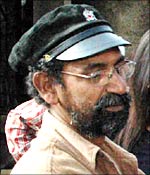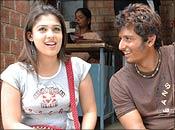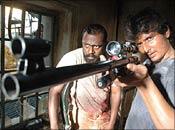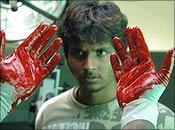|
|
| Help | |
| You are here: Rediff Home » India » Movies » Interviews |
|
 Director S P Jananathan | ||
| |||||||||||||||||||||||
|
| |||||||||||||||||||||||
Director S P Jananathan won the National Award for Best Film in Tamil for his debut venture, Iyarkai. That film had an unusual story of a sailor whose love waits for him onshore.
After three years, Jananathan is back with a film with an unusual title, E, starring Jeeva and Nayanthara.
In this rare interview, the director talks to Shobha Warrier about himself, his first film and, of course, E.
Your first film Iyarkai won the National Award for the Best Tamil film in 2003. Is your next film E in the same format or is it a commercial film?
I don't believe in (classifying films into genres like) commercial or art film. I believe in good cinema and I want to make good films only. We make films for people to see and not keep it in the cans.
Take our fairytales -- there is tempo, rhythm, suspense and climax in all the stories, even in the story of the thirsty crow. There is a book written 2,000 years ago in Tamil on the grammar of stories. In that, they talk about the nava rasas needed in a story, how the hero and heroine should be, how a story should begin and end, etc. The idea behind writing such a book was to teach story-tellers how to sustain the interest of readers.
 But Iyarkai had an unusual story. It did not follow the traditional method of story-telling.
But Iyarkai had an unusual story. It did not follow the traditional method of story-telling.
It was different because I didn't use all the nava rasas in the film. I have only used what is needed for the story.
I have not seen world classics, neither am I a filmmaker who has studied the intricacies of filmmaking. I am a simple man born and brought up in Chennai and studied only up to Std 10, in Tamil medium.
Why didn't you study after the 10th standard?
Nobody asked me to study further. My parents are illiterate; in fact, nobody in my house has had education beyond Std IV or V. As I was the last of the siblings, nobody encouraged me to study further. I didn't even know then that film institutes existed.
How did you get interested in films?
Like any other child, I was also fascinated by films. I watched MGR's films as a child. I was fascinated by his films, the scripts, and the portrayal of MGR as a hero. He was the ideal man in all his films. MGR films became my reference point when I started making films.
Like the characters he portrayed, the protagonists in my films take a strong stand on issues they believe in. But the way I treated the issues and created the characters are different from MGR films.
How did you become a filmmaker from being an admirer of MGR films?
Though I was an admirer of MGR films, ideologically I was with [Tamil rationalist leader] Periyar [EV Ramaswamy Naicker] and Karl Marx. Because of my interest in films, I joined the well known editor B Lenin as his assistant in all his short films. I also worked with late Malayalam director Bharatan and KR's fims.
 How much did your ideology help you in filmmaking?
How much did your ideology help you in filmmaking?
Even if I have a good story and an ideology to portray, if I don't have the technique to present it, my film will be a zero. Similarly, without an ideology and with just technical excellence, your film will have no soul or depth. To create a good art form, you need both in the right proportions. I feel the best filmmakers came from Kerala [Images] and West Bengal because they follow the Marxian ideology.
How did Iyarkai happen? How did you get the idea to have a ship as a background and a woman waiting for her man to return from his journey?
I grew up on the sands of Marina beach (in Chennai). My friends were fishermen's children. I have also worked in the harbour. Many of my friends and their fathers, uncles, brothers used to go sailing for six months at a stretch, and stay with their families for a month. The people I knew were not educated but after the trip, they would tell us stories about what happened in Russia [Images], Germany [Images], the West Indies [Images], etc. They may be uneducated but their knowledge of the world and the affairs of the world were amazing.
Actually, the story of Iyarkai was about an uncle of a friend whose ship sank in the Mediterranean Sea. He had got married just before embarking on the voyage. He had given us a treat the day before he left and told us that it would be his last trip as he wanted to settle down when he returned. His body was not recovered and his wife still waits for him to come back.
I thought you were influenced by a Hollywood film...
Many people have told me that but where do I get the chance to see English films? When I told the story to Ram Kumar, the son of Sivaji Ganesan [Images], he was amazed by the story. Then, he wanted me to see a film based on Hemingway's Old Man And The Sea. Finally, it was Ram Kumar's cousin, Kumar, who became the producer of the film because he was fascinated by the subject.
Were you disappointed with the box office response?
To tell you the truth, everybody associated with the film, the producer, the distributors, etc got a profit. It may be little but nobody lost money. That was because I made the film on a shoestring budget.
How did you take the news of getting the National Award?
Do you know it was the first award that I won in my life? Even now, I cannot believe that I won the National Award. Not even in my wildest dreams did I hope to go to Delhi and collect a National Award from the President. It was my cinematographer Ekambaram who sent the film to the National Award committee. I thought perhaps he would get an award for cinematography but not the film!
There were big films like Virumandi (by Kamal Haasan [Images]) and Pitamahan (Bala's film for which Vikram won the Best Actor award) in contention.
As the President [APJ Abdul Kalam [Images]] was from Tamil Nadu, I told him in Tamil that I shot the film in Rameswaram, which is his hometown. He was very happy to hear that.
 Was it difficult to make your next film? It was in 2003 that you won the National Award, and your second film is releasing in 2006.
Was it difficult to make your next film? It was in 2003 that you won the National Award, and your second film is releasing in 2006.
If you want to make films in the way you believe in, it will take time. I am not bothered about the time factor. I will make films only when I have to say something.
Does that mean you are not interested in the fame and money that come with films?
My primary concern is making the kind of films I believe in. If I am honest in doing so, fame and money will follow.
Tell us about E. Why did you cast Jeeva?
I wanted a young hero for my film, say like Dhanush, Bharath or Jeeva. At that time, I happened to see Jeeva's Ram and I was very impressed with his performance. So I decided to talk to Jeeva first. He liked the story and immediately asked his father, R B Chowdhary, whether he would produce the film. His father agreed to produce the film, and now, it is ready for release this Diwali.
What is the story of E?
It is about a young man who was born and brought up in a slum in Chennai. But he can be the product of any city because all big cities have at least one slum. They are the people who take care of the rich of the city by cleaning the roads, houses and drains. In short, slums are there to service the rich. Those who live in slums live the most difficult life, more difficult than what you see in the poorest village.
A young man living in the slum is actually a wastrel; he doesn't have a proper job. He doesn't have education. So, a lot of criminal activities take place there. But there are also very good people there.
I have picked up such a young man from a slum. He has no morals, no friends, no relationships. He just drifts through life. He is associated with a criminal (Pasupathy), and one incident changes his perspective on life. The man responsible for that incident is played by Ashish Vidyarthi. It opens the young man's eyes and now he wants to help people, the same people against whom he was working all those days. From a bad man, he turns into a good man.
A good man like what MGR used to play?
Exactly. I have not given any grey shades to him; there is only high contrast; he was very bad first and then turns very good.
But in real life, there are no such black and white characters.
Yes. But my film is not an exact replica of life. I have given it high contrast to make it more striking. I also want drama in my films. I feel there is more drama and heroism in real life than in films. Take the life of Bhagat Singh, for example.
Does a heroine have any importance in the film?
All the characters in the film support my hero and his deeds. The heroine in the film, played by Nayanthara, is a bar dancer.
Why such an unusual title for a film?
E is the short form for Easwar, the name of my hero. In fact, I know a man called E in real life. I decided to name the film E because of him. He represents the essence of life in a slum in India.
Was it because you grew up among fishermen's kids that you decided to include gana songs?
If you listen to the lyrics, you will understand that they are not just songs; they sing about the pain in the lives of fishermen, the poorest in the society. Many songs are lost now. I have used many such original gana songs in my film in order to revive them.
|
|
| © 2008 Rediff.com India Limited. All Rights Reserved. Disclaimer | Feedback |